COMPARING COEFFICIENTS OF POLYNOMIALS
Subscribe to our ▶️ YouTube channel 🔴 for the latest videos, updates, and tips.
Problem 1 :
2z – 3 is a factor of 2z3 – z2 + az – 3. Find a and all zeros of the cubic.
Solution :
Since 2z – 3 is a factor, 2z - 3 = 0
2z = 3
z = 3/2
Given, 2z3 – z2 + az – 3
z = 3/2 substitute the given equation.
2(3/2)3 – (3/2)2 + a(3/2) – 3 = 0
2(27/8) - 9/4 + 3a/2 - 3 = 0
27/4 - 9/4 + 3a/2 - 12/4 = 0
6/4 + 3a/2 = 0
3/2 + 3a/2 = 0
3/2 = -3a/2
a = -1
So, the value of a is -1.
(2z3 – z2 - z – 3) ÷ (2z - 3)
Using synthetic division.
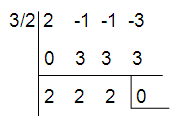
(2z2 + 2z + 2) = 0
2(z2 + z + 1) = 0
Dividing 2 on each sides.
z2 + z + 1 = 0
a = 1, b = 1, c = 1
Using quadratic formula.
b2 - 4ac = 12 - 4(1)(1)
= 12 - 4
= -3
z = -1 ± i3
Problem 2 :
3z + 2 is a factor of 3z3 – z2 + [a + 1]z + a. Find a and all the zeros of the cubic.
Solution :
3z + 2 is a factor.
3z + 2 = 0
3z = -2
z = -2/3
Given, 3z3 – z2 + [a + 1]z + a
3z3 – z2 + az + z + a
z = -2/3 substitute the given equation.
So, the value of a is 6.
(3z3 – z2 + [a + 1]z + a) ÷ (3z + 2)
3z3 - z2 + [6 + 1]z + 6 ÷ (3z + 2)
3z3 - z2 + 7z + 6 ÷ (3z + 2)
Using synthetic division.
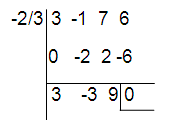
3z2 - 3z + 9 = 0
3(z2 - z + 3) = 0
Equating each factor to 0, we get
z = 0
z(z2 - z + 3) = 0
a = 1, b = -1, c = 3
Using quadratic formula.
b2 - 4ac = (-1)2 - 4(1)(3)
= 1 - 12
= -11
Problem 3 :
Both 2x + 1 and x – 2 are factors of P(x) = 2x4 + ax3 + bx2 – 12x – 8. Find a and b and all zeros of P(x).
Solution :
2x + 1 and x – 2 are factors
|
2x + 1 = 0 2x = -1 x = -1/2 |
x - 2 = 0 x = 2 |
P(x) = 2x4 + ax3 + bx2 – 12x – 8
x = -1/2 substitute the given equation.
P(-1/2) = 2(-1/2)4 + a(-1/2)3 + b(-1/2)2 – 12(-1/2) – 8 = 0
2(1/16) + a(-1/8) + b(1/4) + 6 - 8 = 0
1/8 - (a/8) + (b/4) - 2 = 0
-(a/8) + (b/4) + (1/8) - 2 = 0
-(a/8) + (b/4) = 15/8
-a + 2b = 15 -----(1)
x = 2 substitute the given equation.
P(x) = 2x4 + ax3 + bx2 – 12x – 8
2(2)4 + a(2)3 + b(2)2 – 12(2) – 8 = 0
32 + 8a + 4b - 24 - 8 = 0
8a + 4b = 0
Dividing by 4, we get
2a + b = 0 ----(2)
2 (1) + (2) ==>
-2a + 4b + 2a + b = 30 + 0
5b = 30
b = 6
Applying the value of b in (1), we get
-a + 2(6) = 15
-a + 12 = 15
-a = 15 - 12
-a = 3
a = -3
P(x) = 2x4 - 3x3 + 6x2 – 12x – 8
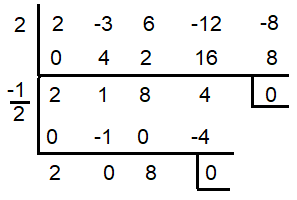
2x2 + 8 = 0
Dividing the equation by 2, we get
x2 + 4 = 0
x2 = -4
x = ±i2
The zeroes are x = ±i2, x = -1/2 x = 2
Problem 4 :
x + 3 and 2x – 1 are factors of 2x4 + ax3 + bx2 + ax + 3. Find a and b and hence determine all zeros of the quartic.
Solution :
x + 3 and 2x – 1 are factors.
|
x + 3 = 0 x = -3 |
2x - 1 = 0 2x = 1 x = 1/2 |
2x4 + ax3 + bx2 + ax + 3
x = -3 substitute the given equation.
2(-3)4 + a(-3)3 + b(-3)2 + a(-3) + 3 = 0
2(81) - 27a + 9b - 3a + 3 = 0
162 - 30a + 9b + 3 = 0
165 - 30a + 9b = 0
-10a + 9b = -165
-10a + 3b = -55 ---(1)
x = 1/2 substitute the given equation.
5a + 2b = -25 ---(2)
(1) + 2(2)
-10a + 3b + 10a + 4b = -55 - 50
7b = 105
b = 15
Applying the value of n in (1), we get
5a + 30 = -25
5a = -55
a = -11
Problem 5 :
x3 + 3x2 - 9x + c has two identical linear factors. Prove that c is either 5 or -27 and factories the cubic into linear factors in each case.
Solution :
x3 + 3x2 - 9x + c
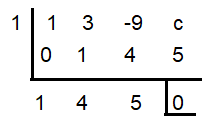
If x = 1 is a solution, then x -1 will be a factor, then the value of c will be -5.
Since we cannot factories x2 + 4x + 5
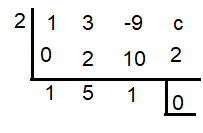
(x - 2) is a factor, then c will be -2.
(x3 + 3x2 - 9x + c) ÷ (x - 3)
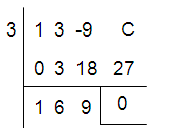
(x - 3) is a factor, then the value of C is -27.
P(x) = x2 + 6x + 9
= (x + 3) and (x + 3)
= (x + 3)2
So, P(x) = (x - 3) (x + 3)2.
Problem 6 :
3x3 + 4x2 – x + m has two identical linear factors. Find m and find the zeros of the polynomial in all possible cases.
Solution :
3x3 + 4x2 – x + m
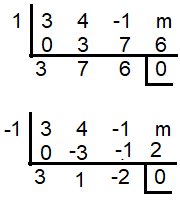
If (x - 1) is a factor, then the value of m will be -6. But the quadratic polynomial created by the left over will not have repeated factor.
If (x + 1) is a factor.
3x2 + x - 2 = 0
(3x - 2) and (x + 1) = 0
|
3x - 2 = 0 3x = 2 x = 2/3 |
x + 1 = 0 x = -1 |
So, the repeated factor is (x + 1).
Subscribe to our ▶️ YouTube channel 🔴 for the latest videos, updates, and tips.
Recent Articles
-
Finding Range of Values Inequality Problems
May 21, 24 08:51 PM
Finding Range of Values Inequality Problems -
Solving Two Step Inequality Word Problems
May 21, 24 08:51 AM
Solving Two Step Inequality Word Problems -
Exponential Function Context and Data Modeling
May 20, 24 10:45 PM
Exponential Function Context and Data Modeling